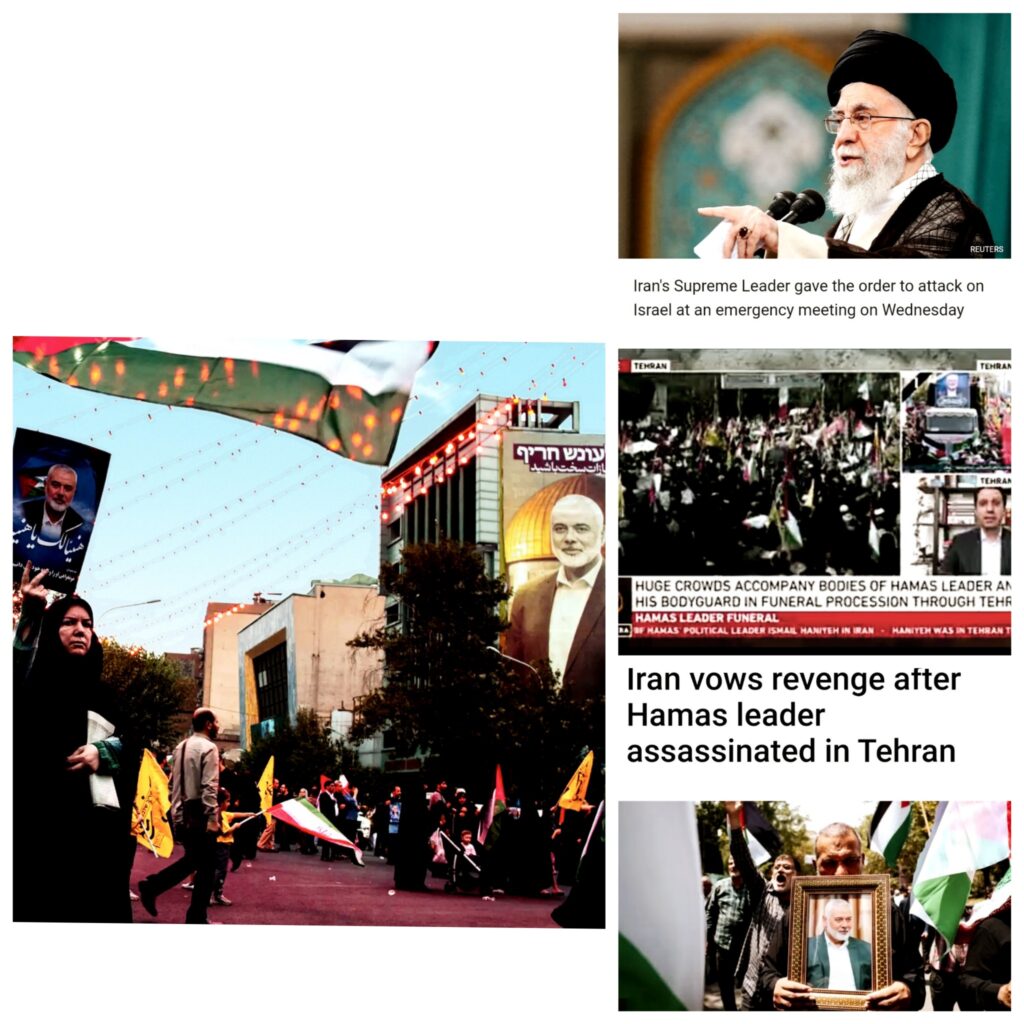Manashimaya

The murder of Hamas leader Haniyeh in Iran has escalated tensions in the Middle East and opened a new front in regional conflict.
The Middle East has been rocked by the death of Hamas political leader Ismail Haniyeh in Tehran, which represents a dramatic and worrying intensification of the continuing conflict between Israel and the militant group. The loss of Haniyeh is a strategic and symbolic setback for Hamas, exacerbating the already unstable situation in the area.
A Critical Moment in Middle Eastern Politics
The killing of Hamas leader Haniyeh in Iran represents more than simply the removal of a significant player; it also has the potential to fundamentally change the course of the conflict. As the leader of Hamas’s political operations, Haniyeh was instrumental in formulating the organization’s foreign policy and engaging in negotiations. His passing creates a hole in the Hamas leadership structure, which could cause instability in the organization’s activities and hinder its ability to negotiate in the future.
The murder took place at a time when Middle Eastern tensions were at an all-time high, especially after Hamas’s October 7 strikes on Israel. Israel responded quickly and harshly, going after important Hamas members as well as other extremist organizations that support Iran. The assassination of Haniyeh in Tehran exposed the growing involvement of neighboring states in the conflict and brought the covert war between Iran and Israel to light.
Hamas’s Response and Regional Repercussions
In the immediate wake of Haniyeh’s death, Iran and Hamas both responded forcefully. Hamas called the strike that killed Haniyeh a “grave escalation” in the continuing conflict and accused Israel of carrying it out. Ayatollah Ali Khamenei, the Supreme Leader of Iran, declared that Haniyeh’s assassination was a “heinous crime” that would not be tolerated and pledged to exact revenge. Given that Iran has long been a major financial and military backer of Hamas, this language coming from Tehran portends a deadly escalation.
The most senior military leader of Hezbollah, Fu’ad Shukr, was also killed in Beirut at the same time as the assassination. Israel’s two strikes against leaders of groups that receive support from Iran reveal a dramatic change in the parameters of the conflict and fuel concerns about a wider regional conflict. With tensions running high, the assassination of Haniyeh has the potential to trigger a series of retaliatory actions from Iran and its allies, further destabilising the region.
Implications for Ceasefire Talks and Hostage Negotiations
Hamas leader Haniyeh’s assassination in Iran also has significant implications for the ongoing ceasefire talks and hostage negotiations between Hamas and Israel. Haniyeh was a key figure in these discussions, often serving as a mediator between Hamas and international stakeholders, including Qatar and Egypt. His death could complicate these delicate negotiations, making it even more challenging to reach a ceasefire agreement and secure the release of hostages still held in Gaza.
Haniyeh’s role in these talks was pivotal, and his absence will likely create a leadership vacuum within Hamas, potentially leading to internal power struggles and a more fragmented approach to negotiations. The assassination also sends a strong message to other Hamas leaders, signalling that Israel is willing to target high-ranking officials, regardless of their location.
The Broader Impact on Regional Stability
The assassination of Hamas leader Haniyeh in Iran is not just a blow to the militant group; it is a significant escalation in a conflict that has already had widespread regional implications. The killing has the potential to ignite a broader conflict, drawing in other regional powers and complicating efforts to de-escalate tensions.
Iran’s involvement in the conflict has always been a point of contention, with Israel viewing Tehran as a primary antagonist due to its support for Hamas and other militant groups. Haniyeh’s assassination on Iranian soil is likely to exacerbate these tensions, potentially leading to confrontations between Israel and Iran. The situation is further complicated by the involvement of other regional players, including Hezbollah in Lebanon and various factions in Syria and Iraq, all of which could be drawn into the conflict.
The Global Response and International Implications
The assassination of Hamas leader Haniyeh in Iran has also drawn attention on the global stage. The United States has denied any involvement in the strike, but the incident has nonetheless strained its relations with regional allies and added a new layer of complexity to its foreign policy in the Middle East. The international community, particularly countries involved in the ceasefire talks, now faces the challenge of navigating this volatile situation while trying to prevent a broader conflict.
In response to Haniyeh’s assassination, there have been calls for restraint from various international leaders, with many urging both Israel and Hamas to avoid further escalation. However, the assassination has also underscored the limitations of diplomacy in the region, where violence and retribution often take precedence over negotiations and peaceful resolutions.
Conclusion: A Dangerous New Phase in the Middle East Conflict
The assassination of Hamas leader Haniyeh in Iran marks a dangerous new phase in the ongoing conflict between Israel and Hamas. The killing has not only removed a key figure from the group’s leadership but also escalated tensions to a point where a broader regional conflict seems increasingly likely. With Iran vowing to avenge Haniyeh’s death and Israel remaining resolute in its military operations, the prospects for a peaceful resolution appear bleak.
As the situation continues to unfold, the assassination of Haniyeh will likely be remembered as a turning point in the Middle East conflict, one that could have far-reaching consequences for regional stability and international relations. The world watches with bated breath as this new chapter in the conflict between Israel and Hamas unfolds, with the hope that diplomacy can somehow prevail over the rising tide of violence.
